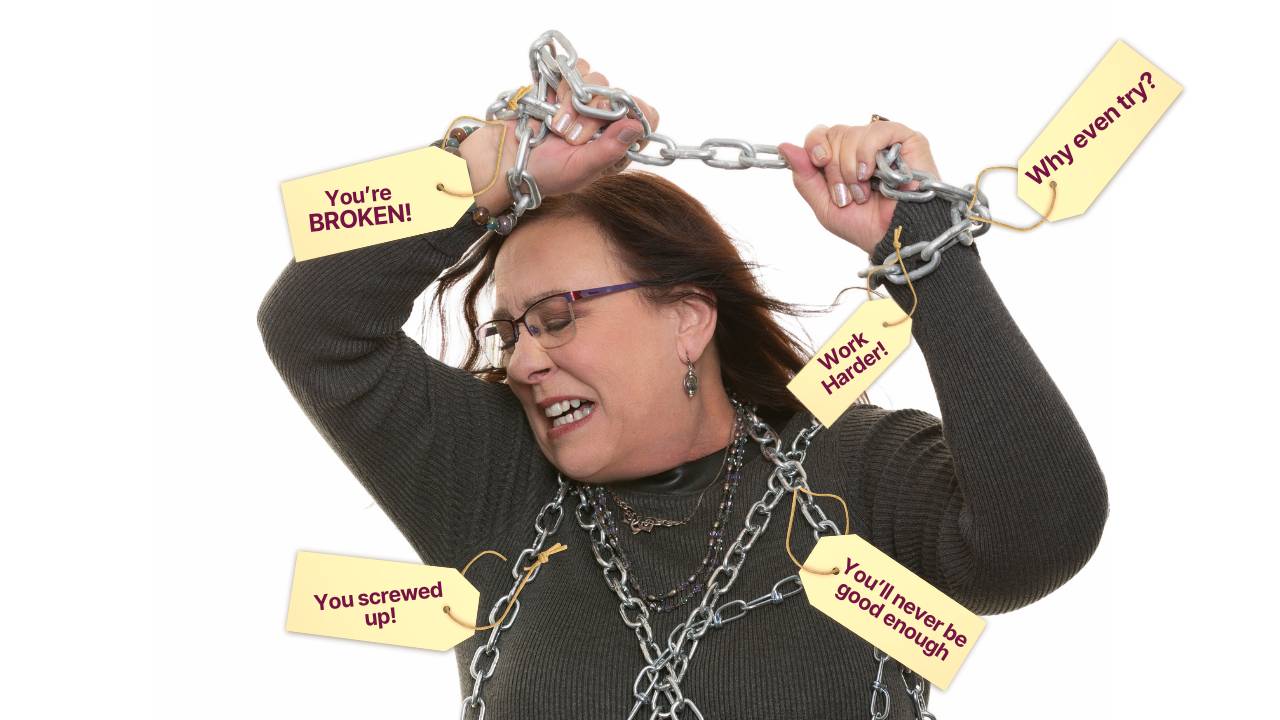
How to Stop Fighting Yourself and Start Thriving
Your own worst enemy. That phrase might sting, but if you’re like me, it may also sound… familiar. For years, this truth was a weight I carried, one I’d heard enough in childhood to turn into an internal script.
Hearing it over and over again shaped how I saw myself. I began to believe that my emotions were somehow “too much” or not even valid – that maybe something was broken inside me. And so, I became the hardest-working critic I knew. Mistakes? Unacceptable. Small setbacks? Proof that I wasn’t good enough. This all led me straight into workaholism, self-doubt, and relentless self-criticism – beating myself up became almost a reflex.
But here’s what I’ve learned on this journey: recognizing that I am my own worst enemy was the first step to change. And with that awareness, I started using tools to challenge these old, ingrained beliefs, (and continue to use them today) making space for a new relationship with myself. Today, I want to share what helped me – and what can help you too – when you feel like you’re fighting against yourself.
What Does It Mean to Be “Your Own Worst Enemy”?
Being your own worst enemy means more than just a tendency toward self-criticism; it’s about engaging in habits and thoughts that undermine your own well-being. It’s that voice in your head that says, “You’ll never be good enough,” or “Why even try?” It shows up in small ways – beating yourself up over a tiny misstep, pushing yourself to burnout, letting doubt keep you from pursuing something you love.
For many of us, this mindset can feel normal. But, beautiful soul, that voice that chips away at your confidence and convinces you that you’re unworthy? It’s a lie, one we’ve often internalized from external expectations and old fears. Being your own worst enemy means you’re standing in your own way, blocking yourself from thriving.
Why Do People Say “You Are Your Own Worst Enemy”?
You’ve probably heard the phrase countless times: “You are your own worst enemy.” But why does it stick with us? The reason this phrase hits home is that, deep down, we know there’s truth to it. We can be hard on ourselves in ways we wouldn’t dream of being with others.
Psychologists often call this self-sabotage – patterns of thought and behavior that seem to protect us but ultimately prevent us from achieving our goals. These patterns can stem from things we’ve internalized, often unconsciously, over years: societal pressures, family expectations, or unresolved fears.
When we learn to pause and challenge these self-sabotaging habits, we make room for growth. We stop holding ourselves back and start allowing ourselves to flourish.
How to Recognize if You’re Your Own Worst Enemy
The signs of self-sabotage can be subtle, but with awareness, you can start recognizing them. Here are a few common ways we unknowingly become our own worst enemy:
-
Negative Self-Talk: That inner critic is on a 24/7 schedule, pointing out every flaw, every failure, every potential shortcoming. “I’m such a mess.” “I’ll never get this right.” Sound familiar?
-
Fear of Failure (or Success): We avoid opportunities out of fear – of failing, of being judged, or sometimes even of succeeding and facing the pressure to sustain it.
-
Procrastination and Perfectionism: These go hand-in-hand. By putting things off or endlessly tweaking, we convince ourselves we’re protecting ourselves, but we’re just delaying progress.
-
Workaholism: When we equate our worth with our output, we set ourselves up for burnout, often because we’re trying to “prove” our value.
-
People-Pleasing and Avoiding Boundaries: Saying “yes” to everything and everyone might seem kind, but when it comes at the cost of your own needs, it’s just another way to avoid prioritizing yourself.
If you’re seeing these patterns, you’re not alone. Many of us do this. But the good news? Awareness is the first step to change.
What to Do When You Are Your Own Worst Enemy
Once you see these self-sabotaging patterns for what they are, the real work begins. Here are practical steps to gently, but persistently, shift the way you respond to those familiar, unhelpful thoughts.
1. Cultivate Awareness
The most powerful step I took was becoming aware of what I was telling myself – all those inner monologues that reinforced my worst fears. I learned to pause and ask, “Is this true?” Am I really unworthy because of one mistake? Am I actually doomed to fail at this project?
Sometimes, just the act of questioning a thought gives it less power.
2. Reframe Your Thoughts
Here’s the trick: once you recognize the thought, you get to reframe it. I’d replace “I’ll never be good enough” with something more encouraging, like, “I am enough, and I’m growing every day.” It may sound simple, but practicing this is powerful. Each time that old, negative voice creeps in, you have the chance to rewrite the script.
3. Consistency Is Key
This transformation doesn’t happen overnight. Those familiar, critical thoughts will come back, but every time they do, I remind myself: No, that doesn’t serve me anymore. Instead, I choose this positive outlook. And over time, the new beliefs began to stick.
Think of this as building a muscle; the more consistently you do it, the more natural it feels. You stop being your own worst enemy and start being your own best advocate.
How Self-Leadership Can Help You Stop Being Your Own Worst Enemy
The truth is, being your own worst enemy is incompatible with self-leadership. Self-leadership means guiding yourself with the same compassion, patience, and encouragement you’d offer someone you love. It’s the antidote to self-sabotage and the beginning of a new, empowered relationship with yourself.
Here’s where I encourage you to dive deeper. My article on LinkedIn, “Self Leadership: The Key to Leading Yourself and Others to Success,” takes a closer look at self-leadership. Discover the transformative power of self-leadership! Learn how guiding yourself with purpose, resilience, and integrity can unlock authentic success and inspire others. Dive in to explore key traits, practical tips, and why true leadership starts within.
Final Thoughts: Becoming Your Own Ally
Brave soul, remember that breaking free from self-sabotage is a journey. There will be days when the old, familiar critical voice slips back in. But with each thought you challenge, each boundary you set, and each moment of grace you give yourself, you’ll be stepping further away from that “worst enemy” role.
Your path to becoming your own best ally is unique, but it’s a path worth walking. Let’s remember that every time we choose kindness over criticism, we’re showing up for ourselves. And every time we practice self-leadership, we’re building a foundation for resilience, peace, and growth.
P.S.: The goal isn’t perfection; it’s progress and choosing, day by day, to support yourself the way you’d want a friend to support you.
P.P.S.: Let’s connect on LinkedIn - join me there for more insights and tips daily on your journey to a life you truly love!
#SelfSabotage #MindsetMatters #OvercomeFear
Stay connected with news and updates!
Join our mailing list to receive the latest news and updates from our team.
Don't worry, your information will not be shared.
We hate SPAM. We will never sell your information, for any reason.









